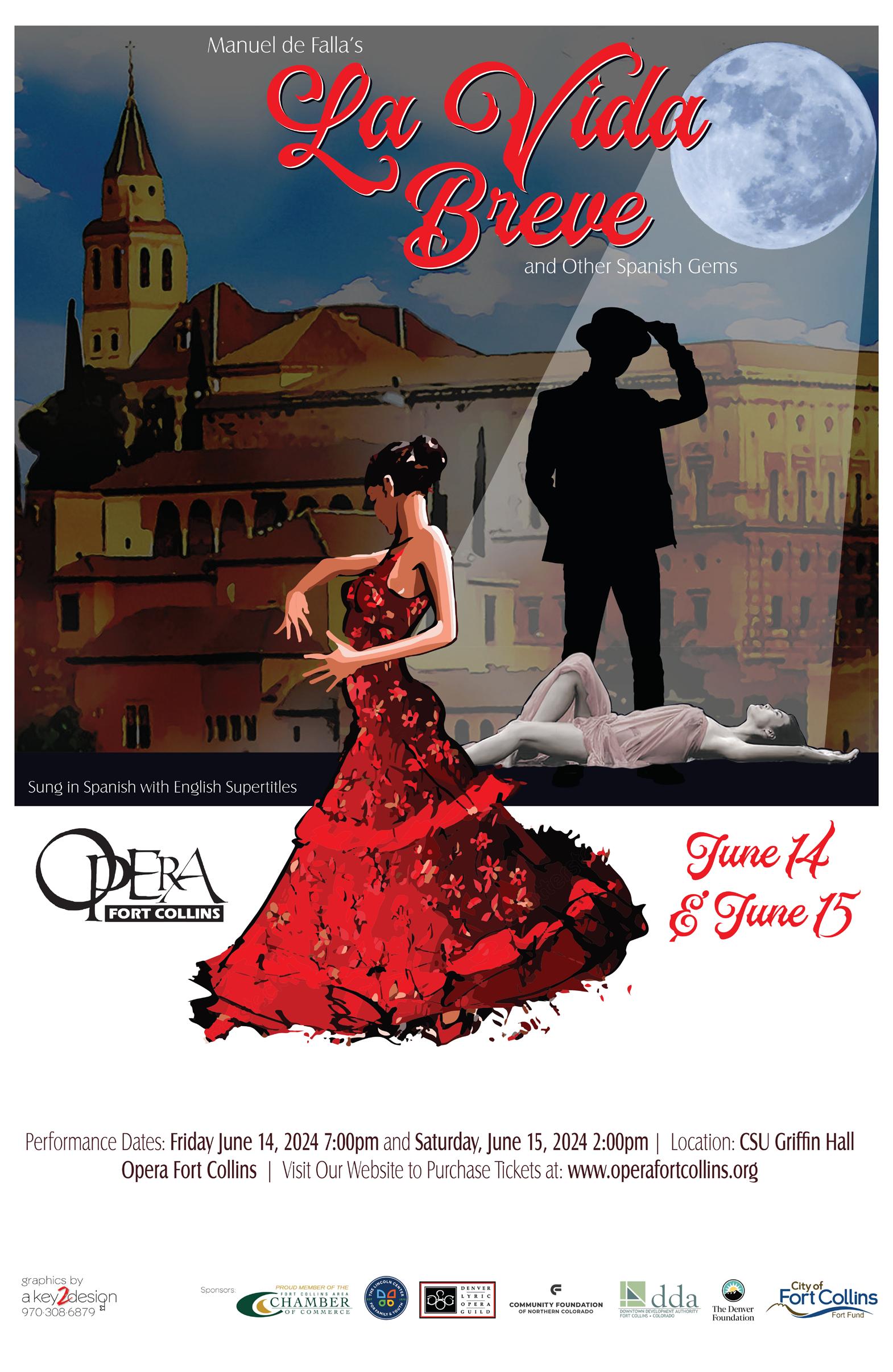THE RALPH OPERA PROGRAM PRESENTS

APRIL 4-7, 2024 |
DIRECTED BY TIFFANY BLAKE FEATURING THE CSU OPERA ORCHESTRA CONDUCTED BY RACHEL WADDELL
GRIFFIN CONCERT HALL • UNIVERSITY CENTER FOR THE ARTS


APRIL 4-7, 2024 |
DIRECTED BY TIFFANY BLAKE FEATURING THE CSU OPERA ORCHESTRA CONDUCTED BY RACHEL WADDELL
GRIFFIN CONCERT HALL • UNIVERSITY CENTER FOR THE ARTS
Thursday, 4/4, 7:30 p.m. Friday, 4/5, 7:30 p.m.
Saturday, 4/6, 7:30 p.m. Sunday, 4/7, 2:00 p.m.
Hänsel, a young boy: Susanna Jacobson Aspen Ulibarri
Gretel, his sister: Amity Matthews Mykayla Fitzpatrick
Gertrude, their mother: Hayley Wood Tiffany Blake
Peter, their father: Chandler Peveto Alec Mendez
Understudy: Caleb Green
The Witch: Brianna Dene Kristy Shuck
The Sandman: Maddie Flanagan Maddie Flanagan
The Dew Fairy: Hayley Price Hayley Price
Chorus:
Anna Dunn, Audrey Farrar, Maddie Flanagan, Sherri Garrett, Caleb Green, Maddie McGinnis, Alec Mendez, Gemma Petrucci, Chandler Peveto, Hayley Price, Tirzah Rowe, Freya Underwood
Violin I
Cesar Ryes, Concertmaster
Russell Wolfe
Kirby Miller
Isabel Ulate
Hallie Harris
Violin II
Annie Smith, Principal
Kathryn Carlos
Lamarana Balde
Grace Marsh-Wood
Melissa Kelley
Katelyn Gould
Viola
Percy Slovut, Principal
Ethan Buell
Madison Ramonette
Cello
Avery Smith
Matt Fox
Lillian Rogers
Kristin Weninger
Bass
Max Williams, Principal
Nick Hailey
Flute
Jenna Moore, Principal
Lucy McCrossan
Ella Patterson, piccolo
Oboe
Madina Rashidova, Co-principal
Sarah Veldhuizen, Co-principal
Bassoon
Charlie Beauregard, Principal
Shane Underwood
Clarinet
Bradley Irwin
Andrew Rutten
Horn
Jacob Andersen, Principal
Rachel Richardson
Erin Wilson
Sophia Marino
Trumpet
Kris Usrey
Dylan Crabill
Trombone
Christian Heck
Andre Ranis
Shae Mitchell
Tuba
Carson Ross
Percussion
Quinn Harlow
Taylor Smith
Stuart Hoskins
PRODUCTION TEAM:
Stage Director: Tiffany Blake
Music Director, Orchestral: Rachel Waddell
Music Director, Vocal: Tim Burns
Rehearsal Pianist: Juhyun Lee
Scenic Designer: Savannah Jackson
Assistant Scenic Designer: Hailey Kennedy
Properties Master: Amber Campbell
Lighting Designer: Jake Mosier
Assistant Lighting Designer: Alex Zaga
Costume Designer: Libby Williams
Assistant Costume Designer: Adie Sutherland
Hair/Makeup Designer: Libby Williams
Production Stage Manager: Annie Hennen
Assistant Stage Manager: Danae Johnson
Deck Crew: Lillie Brooks, Kodi Campbell, Justin Maddock
Wardrobe Crew: Olivia Bridenbaugh, Justin Simental, Carmen Warren
Electrics Crew: Kathrine Gradyan, Koryn McManus, Roman Ramirez
A1: Vijiay Silikaham
Supertitles: Kristy Shuck
Supertitle Operators: Kristy Shuck and Brianna Dene
Producer/Artistic Director: Price Johnston
Production Manager/Technical Director: Steven Workman
Costume Shop Manager: Elise Kulovany
Cutter/Draper: Rebecca Evans
Master Electrician: Wes Halloran
Production Stage Manager: Matt Grevan
Scenic Charge Artist: Karl Hermanson
Head of Props: Melissa Centgraf
Master Carpenter: Johnie Rankin
Wardrobe Head: Annecy Wood
Hair and Make Up Head: Britney Juarez
Electrics Shop Team: Spencer Ammon, Katherine Barr, Cooper Cox, Dale Kaiser, Jessie King, Blake Kirkpatrick, Henry Ledbetter, Katie Simonson
Paint Shop Team: Charlotte Daysh, Ruby Duka, Peyton Farnum, Anna Higgins, Dani Ranisate, India Thompson, Caitlin Wieland
Costume Shop Team: Hollis Andrew, Brooke Bowman, Charlotte Daysh, Tiana Fuentes, Maddie Engeman, Annie Hennen, Helen Jewert, Britney Juarez, Lillie Pooler, Adie Sutherland, Ayumi Yamada
Scenic Shop Team: Nicole Bell, Gabriel Castro, Mason Chamberlain, Tessa Snyder
Props Team: Amber Campbell, Ash Campbell, Jesus Castro Gonzalez, Annie Hennen, Avi Miller, Bridget Poulter, Rachel Ross, Trey Wallen
Audio Team: Isabella Knott, Audrey McCrea, Samantha Neptune, Tessa Snyder, David Walters
Engelbert Humperdinck (1845–1921), a German composer and teacher who composed his first stage work at age thirteen, hoped to pursue music as a career from childhood. His parents were against the idea and wanted him to study architecture. After excelling in a music class at Cologne Conservatory, however, he officially entered the institution, where he spent the next four years. Through his studies, Humperdinck had the opportunity to travel to France, Italy, and Spain. Afterward, he began to compose full-time and eventually became a teacher. He also went to work for Schott, the Mainz publishing house, editing operas and writing opera critiques; this soon became his primary source of income when he could not compose due to pulmonary disease. Throughout his lifetime, Humperdinck encountered multiple medical issues. He also experienced two strokes, one leaving his left hand completely paralyzed, and he developed a hearing disorder that left him partially deaf for the rest of his life. His wife Hedwig Taxer and his children encouraged him to keep composing after his recovery. Soon though, he suffered two heart attacks followed by complications from pneumonia, which resulted in his death.
During his studies, Humperdinck met many influential composers such as Richard Wagner and Richard Strauss, both of whom he learned from and with whom he maintained lifelong ties. Humperdinck’s friendship with Strauss helped him grow as a composer and Strauss eventually conducted the first performance Hänsel und Gretel, as well as some of Humperdinck’s later compositions. In this much-loved opera, Humperdinck’s use of lighter folk-like music, inspired by his travels, combined with the dense and dramatic influence of Wagner in certain scenes, provided a balance that the French and German public and critics appreciated.
This opera, originally written in 1890 as a small play for Humperdinck’s nephews and nieces, began with four songs composed to the words, or libretto, written by his sister, Adelheid Wette (1858–1916). She loosely based her tale on the Brothers Grimm fairytale of Hänsel und Gretel, but approached the story lightly, making it more child friendly. The performance was a private viewing, just between family and friends, but the response was such that Humperdinck was convinced to turn the fairy tale into a full-fledged opera. The following year, he added more songs and orchestrated them, producing a Singspiel (a form of German light opera, usually with spoken dialogue); later, he presented the score to his wife as an engagement present. Due to work and family issues, the completion of Hänsel und Gretel as a full-scale production was postponed until September 17, 1893. The premiere took place on December 23, 1893, in Weimar, Germany. The musical drama still captivates audiences today with its magical adventures, representation of childhood, and strong lyrical tunes, making it accessible to audiences of all ages.
Hansel and Gretel are left at home to do their chores. Hansel complains about how hungry he is, and Gretel cheers him up by telling him a secret: A neighbor has given their mother a jug of milk, and tonight she’ll make a custard pie for them to eat! Their work is forgotten as they begin to dance and sing.
When their Mother returns, she is furious to find their chores undone. She threatens to beat them, and in her anger, she knocks over the jug of milk. She sends the children to the forest to look for strawberries. Alone, she expresses her sorrow and frustration that she is unable to feed her children and asks God for help.
Peter, Hansel and Gretel’s father, bursts into the house, roaring drunk, and kisses mother roughly. She pushes him away and scolds him for being drunk. He surprises her by taking from his pack a feast: vegetables, butter, flour, sausages, eggs, and even coffee! He explains to her that he successfully sold all his brooms at the highest prices. Mother tells him of the broken jug, and he helps her to find the humor in the situation. He asks where the children are, and she tells him that they are in the Ilsenstein forest. Horrified, he tells her that the evil Gingerbread Witch dwells in the forest, luring children with cakes and sweets, and turning them into gingerbread children. Father and mother rush to the forest to search for their children.
Gretel and Hansel play and gather strawberries in the woods. Listening to a cuckoo bird, they eat the berries, pretending to be little birds themselves. Realizing the basket is empty, Gretel scolds Hansel and tries to look for more, but it’s too dark for her to see. Hansel tries to find the way back, but he cannot. As the forest darkens, Hansel and Gretel become scared and their imaginations run wild, seeing danger in the forest.
The Sandman comes to protect the children and lull them to sleep. The children sing their nightly prayer and then they fall asleep on the forest floor.
The Dew Fairy comes to wake the children. Gretel wakes first, and revels in the beauty of the forest and the birdsong. She wakes Hansel and they talk about their mutual dream, of angels protecting them as they slept.
Suddenly, they notice a glorious gingerbread house! Unable to resist temptation, they take a little bit of the house and nibble on it. As the children nibble, a voice calls out, and Hansel and Gretel decide that the voice must have been the wind, and they begin to eat the house. The witch comes out of the house and captures Hansel. The witch introduces herself as a friend to children, but Hansel and Gretel are suspicious and try to run away. Using her magic wand, the witch stops them and forces Gretel to lock Hansel in a cage. The witch feeds Hansel to fatten him up before eating him.
The witch prepares her oven to roast the children. She wakes Hansel and asks him show her his finger. Believing him too thin, the witch calls for Gretel to bring out raisins and almonds to feed Hansel. As the witch tries to feed Hansel, Gretel steals the wand from the witch’s pocket and frees Hansel from the witches’ spell.
The witch tells Gretel to peek inside the oven to see if it is hot enough. Hansel softly calls out to her to be careful. Gretel pretends that she doesn’t know what the witch means and asks the witch to demonstrate. The witch leans into the oven and the children spring into action, shoving her in.
The gingerbread children appear, asking to be touched. Hansel is afraid, but Gretel touches one on the nose, and she wakes. Hansel takes the witch’s wand and, waving it, calls out the magic words, completely freeing the children from the spell. The gingerbread children celebrate and thank Hansel and Gretel.
Father is heard in the distance, calling for Hansel and Gretel. He and mother enter and embrace Hansel and Gretel. Meanwhile, the gingerbread children pull the gingerbread witch from the oven. Father explains that this is heaven’s punishment for evil deeds and reminds them, “In the darkest hour of grief, Heaven above will send relief.”







